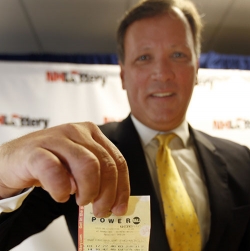The State of New Hampshire is suing the U.S. Department of Justice over the Wire Act. The New Hampshire Lottery Commission (NHLC) sued to stop the Justice Department from enforcing a ban on interstate online gambling.
The New Hampshire Lottery Commission sued new US Attorney General William Barr to stop enforcement of a ban on online casinos, poker room, and lottery ticket sales. The NHLC’s lawsuit is seeking “declarative and injuctive relief” against the DOJ’s new policy.
New Hampshire Gov. John E. Sununu (R-Manchester) said, “Today New Hampshire is taking action to protect public education in New Hampshire. The opinion issued by DOJ puts millions of dollars of school funding at risk, and we have a responsibility to stand up for our students.”
Last month, the U.S. Justice Department’s Office of Legal Counsel (OLC) reversed an opinion on the 1961 Federal Wire Act which had stood 8 years. Since 2011, the OLC held that the Wire Act applied only to online sports betting.
The 2019 states that the Wire Act also bans interstate online casinos and poker sites — in fact, that it bans all forms of online gambling. The interpretation is a direct threat to New Hampshire’s online lottery ticket sales, so the New Hampshire Lottery Commission sued to preempt enforcement that would cost the state hundreds of millions of dollars in tax revenues.
DOJ Opinion Costs New Hampshire Money
In an interview with The Union Leader earlier this week, New Hampshire Lottery Executive Director Charles McIntyr said that “the very narrowest” interpretation of the new DOJ opinion would cost New Hampshire millions of dollars. According to McIntyr, even under the best of circumstances, the new federal policy would cost New Hampshire $4 million to $6 million this year and another $6 million to $8 million next year.
In the interview, McIntyr said, “The New Hampshire Lottery has a responsibility to support education in New Hampshire. Just last year, the New Hampshire Lottery generated $87.5 million in net profits, all of which supports education in New Hampshire and we expect to generate more than $90 million for education this year.”
“This reversal by DOJ puts that support for education in question.”
New Hampshire voted into law the ability to sell online lottery tickets in 2017. Those changes went into effect last year. Since lotto sales go to fund education in New Hampshire, it is money the treasury would have to find elsewhere — perhaps through higher taxes.
It is a problem that other states which have embraced online lottery sales — Georgia and Illinois chief among them — will have to contend with. In most of those states, lottery sales are tied to education funds. For instance, Georgia’s lottery sales bankroll the HOPE Scholarship Fund, which helps Georgia students pay for their postsecondary educations.
New Jersey Wire Act Lawsuit?
The New Hampshire lawsuit is unlikely to be the only suit filed over the Wire Act interpretation. On Thursday, New Jersey’s administration threatened legal action against the DOJ to protect its $300 million a year online gambling industry.
Earlier this week, New Jersey Attorney General Gurbir Singh Grewal joined with Pennsylvania Attorney General Josh Shapiro to write a letter to Acting AG Matthew Whitaker and Deputy Attorney General Rod Rosenstein, asking them to reverse their decision on the Wire Act.
While Bill Barr’s name will be on the New Hampshire lawsuit, it was during Matthew Whitaker’s short term as Attorney General that the reversal happened. In fact, a sealed opinion was signed by Jeff Sessions on November 2, 2018 — five days before Sessions was fired — but Whitaker’s office unsealed the opinion in January 2019.
Strategic Filing of New Hampshire Lawsuit
The New Hampshire Lottery’s decision to file a lawsuit first might be a strategic choice. Legal Sports Report speculated that the wider gambling industry might be backing the NHLC’s case because it would be argued in the First Circuit Court of Appeals, which serves the New England region.
The First Circuit Court of Appeals has a history of backing a narrow interpretation of the 1961 Wire Act. In a 2014 case which involved illegal sports betting operator Todd Lyons (of “Sports Off Shore”), the court ruled that the Wire Act only applies to sports betting.
The law firm of Gibson Dunn & Crutcher LLP (Los Angeles) is representing the New Hampshire Lottery Commission in the lawsuit. Matthew McGill, an attorney for Gibson Dunn & Crutcher, said of the recent DOJ ruling, “The Justice Department’s new Wire Act opinion is quite literally a lawless act. This opinion would subject to felony prosecution conduct that two courts of appeals, including the First Circuit, have said is lawful.”
“That is an outrageous and dangerous usurpation of authority. As Chief Justice Marshall wrote, it is the job of the judiciary to say what the law is. We are asking the court for an immediate ruling that confirms what the First Circuit has held: The Wire Act is limited to sports betting.”
In its landmark 6-3 ruling on a federal sports betting ban, the U.S. Supreme Court made an assertion quite similar to the First Circuit Court of Appeals in the Todd Lyons case. NHLC appears to be on solid constitutional grounds to challenge the current Department of Justice’s opinion on the 1961 Wire Act.

